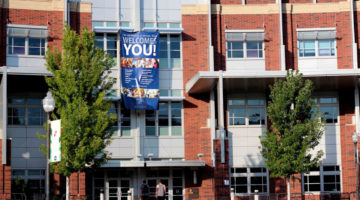REP. DINA TITUS HOSTS ROUNDTABLE AT UNLV
by Jacob Solis
Editor’s Note: This piece is the first in a series detailing the various intricacies of sexual assault on campus, both at UNR and elsewhere.
On Tuesday, Sept. 22, Rep. Dina Titus of Nevada’s first district held a roundtable at the University of Nevada, Las Vegas. There, she met with a variety of groups — from community college students to women veterans — to talk about one thing: sexual assault on college campuses.
The roundtable was organized as a response to a new set of policies proposed by Democratic presidential hopeful Hillary Clinton just a week earlier. Announcing the plan at a rally in Cedar Falls, Iowa, she said, “It is not enough to condemn campus sexual assault. We need to end campus sexual assault.”
It’s the first time Clinton has tackled the issue since launching her campaign, according to NBC News, and Clinton’s campaign is the only one thus far to heavily focus on the issue. It should be noted that the only other candidate to mention women in their platform is Clinton’s main competition, Vermont Sen. Bernie Sanders.
The policy itself is fairly broad, leaving any specificity for later. However, the core of the policy is spelled out clearly on Clinton’s website and comes in three phases: provide support for victims, make justice for victims more transparent, and lastly, increase prevention.
“This is a priority of hers, and so now she’s listening to people to kind of put the meat on the bone, so having specifically addressed these three issues,” Titus said.
As far as the first tenet goes, that of providing support, both the federal government and the University of Nevada, Reno, are doing a fair job. The Obama administration recently launched notalone.gov, an online resource center for students and institutions alike that provides a bevy of informational tools. On top of that, UNR provides services like a sexual assault advocate and counseling services to victims of sexual assault.
For Titus, it’s a solid step in the right direction.
“We had a representative from the chancellor’s office and she was going to take this back to the top administrators and say, ‘Let’s look at the policies that affect the whole campus system,’” Titus said. “So I think the first step of getting more visibility and making this more of a priority is already underway.”
Moreover, Titus explained that more specific policies could be hashed out later by states and individual institutions and that many such specifics were discussed during the roundtable.
“We heard suggestions from The Rape Crisis Center, from the women’s center that runs the hotline for students [and] from people at the community college,” Titus said. “We heard that you need to revamp Title IX proposals that deal with this topic, because they haven’t been looked at in a long time, and usually when they’re addressed its from the standpoint of protecting the accused as opposed to the victim.”
Tenets two and three of Clinton’s plan, which focus on transparency and prevention, have already been addressed by many institutions and the federal government. In 2013, Congress passed the Campus Sexual Violence Elimination Act or SaVE, which added to both the 1990 Clery Act and Title IX.
Specifically, SaVE requires campuses to disclose incidences of sexual and domestic violence as well as requiring minimum standards for disciplinary measures to be taken against offenders, according to The Clery Center.
However, for UNR student Courtney McKimmey, there’s still more to be done.
“During orientation they do a lot of sexual assault presentations and they talk a lot about it, but the education tends to stop there,” McKimmey said. “I think making the resources known, as far as what is available on campus, [should be] better known. Personally speaking, I haven’t been in a situation where I’ve had to look for those resources, but at the moment I don’t know what resources are available to students on campus.”
McKimmey suggested providing the sexual assault training given to ASUN employees or involving the disability resource center, but concedes that question of solving campus sexual assault is a difficult one.
Ultimately, all institutions across the country have a ways to go in the policy-making arena before campus sexual assault ends.
IN PART TWO: A look into how the University of Nevada, Reno, tackles sexual assault and why things are the way the are.
Jacob Solis can be reached at jsolis@sagebrush.unr.edu and on Twitter @TheSagebrush.











